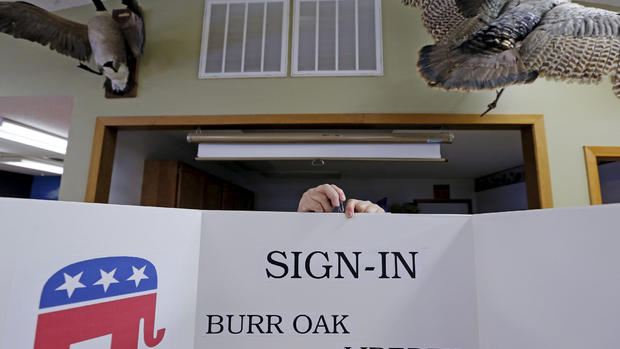Hillary Clinton wins Iowa caucuses
Update:
Hillary Clinton has won the Iowa caucuses, according to the Iowa Democratic Party (IDP). The caucus vote was very close, with Clinton edging out Bernie Sanders 701-697. The Associated Press reports that the IDP has said it will not recount the caucus vote.
Clinton claimed victory at a campaign event in Nashua, New Hampshire, reports CBS News' Hannah Fraser-Chanpong.
"I am coming to New Hampshire after winning Iowa," she said. "I've won there and I've lost there. It's a lot better to win."
Monday's all-important Democratic caucuses in Iowa ended in a virtual tie.
A statement from the party's leader called the finish between Hillary Clinton and Bernie Sanders "historically close," but didn't declare a winner.
Dr. Andy McGuire said Clinton was awarded 699.57 state delegate equivalents, Sanders 695.49, Martin O'Malley 7.68 and uncommitted, .46.
One precinct still hadn't reported, in Des Moines, with 2.28 state delegate equivalents.
Clinton's camp noted that, even if Sanders got all of the 2.28, "Statistically, there is no outstanding information that could change the results and no way that Senator Sanders can overcome Secretary Clinton's advantage."
And so, it said flatly, she "has won the Iowa Caucus."
Earlier, the Sanders camp had declared the results a "virtual draw" and called his efforts "a come-from-behind campaign for the history books."
With about 90 percent of precincts reporting, Clinton and Sanders were in a razor-thin race. Fifty percent of caucus-goers supported Clinton, while 50 percent backed Sanders. After earning just 1 percent support, Martin O'Malley decided to suspend his campaign.
Turnout was high at Iowa's approximately 1,100 precincts, a development that was expected to help the Sanders campaign. Yet a Clinton campaign aide told CBS at the time that they believed they had won.
There was a gender gap, but it wasn't as large as some may have expected. Clinton was leading Sanders among women, 53 percent to 42 percent. Sanders was ahead among men, 50 percent to 44 percent. This also came through among first-time caucus attenders, who were supporting Sanders over Clinton, 59 percent to 37 percent.
Sanders was doing extremely well among younger people. He was getting the support of 84 percent of those under 30 and 58 percent of those 30 to 45. Clinton was very strong among older people; she was getting the support of 58 percent of those 45 to 64 and 69 percent of those over 65.
Sanders support came from liberal Democrats. Those who call themselves very liberal favored him over Clinton, 58 percent to 39 percent. Among those who wanted the next president to pursue more liberal policies than President Obama, Sanders was favored by 76 percent to 21 percent for Clinton.
As many as 68 percent of Democratic caucus-goers described themselves as liberal, up from 54 percent in 2008. Self-identified Democrats were for Clinton, while independents were backing Sanders.
Clinton supporters said they want someone who can win in November and has experience. Sanders voters said they want someone who cares about people like them and who is honest and trustworthy.
While entrance polling showed early trends in Iowa, the participants in the Democratic caucuses had an opportunity to change their minds. The caucus-goers first gathered into groups based on their candidate of choice. There were then two periods of "realignment" during which people can shift their allegiances. During the second realignment, if a candidate did not have the support of at least 15 percent of caucus-goers, their whole group had to disperse to other viable candidates.
Entrance polling also shed some light on the priorities of Iowa caucus-goers: 30 percent said their most important issue was health care, 27 percent said income inequality, 33 percent said the economy and jobs, and 6 percent said terrorism.
Twenty-eight percent of Democratic voters also said experience is their most important quality, while 24 percent said it is honesty. Another 26 percent said it is that the candidate "cares about people like me."
Technically, no national delegates were won on this night. Ultimately, Iowa holds 44 elected delegates who will help determine the nominee at the national convention this summer.
